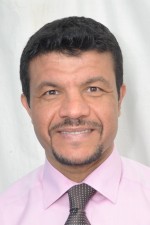Australia Freelance Market News 78
 DEAR READERS,
DEAR READERS,
Dear readers,
KPMG has just published a study of 200 Australian executives and their major concerns for the new year. In this news, you will learn about their top 10 worries, which include digital transformation, the economic environment and regulation challenges.
We will also introduce you to the "Small Business Bushfire Recovery Grants" and discuss the success formula of bestselling author Alan Weiss, which promotes the concept of gradually improving your life by one per cent each day. Our guest article will speak about the barriers which prevent you from living a successful life.
Later on, our freelancer article explains how an already successful coaching process can be enhanced and perfected. Finally our freelancer joke compares the work ethics of employees and freelancers.
I hope you enjoy reading this news and as always I wish you success in business!
Martin Gray
The Small Business Bushfire Recovery Grants – Help for freelancers
 The Small Business Bushfire Recovery Grants provide eligible SMEs and freelancers funding of up to AUD 50,000.
The Small Business Bushfire Recovery Grants provide eligible SMEs and freelancers funding of up to AUD 50,000.
These grants are available for clean-up and asset costs, including:
• equipment and materials to clean up
• additional labour costs
• replacing spoiled stock/goods caused by power outages
• removal and disposal of damaged goods and material
• paying trades-people to do safety inspections
• essential repairs to premises and internal fittings
• purchase or lease costs for equipment essential to immediately resume operations
• leasing of temporary premises
• replacement of stock that´s essential to immediately resume operations.
To be eligible, you must have an Australian Business Number (ABN) and own a small business located in a defined disaster area. Also you must intend to re-establish your business in the defined disaster area.
For eligibility information and the application process, check this.
KPMG survey: Top 10 issues of Australian leaders in 2020
 Digital transformation remains the very top concern of Australian business leaders as they look ahead into 2020, a survey of nearly 200 C-suite executives by KPMG Australia finds.
Digital transformation remains the very top concern of Australian business leaders as they look ahead into 2020, a survey of nearly 200 C-suite executives by KPMG Australia finds.
The third annual edition of "Keeping us up at night: The big issues facing business leaders" finds that an uncertain global political & economic environment, climate change, leadership capability, accountability & stability, and workforce up-skilling have all risen to the top 10.
Gary Wingrove, CEO of KPMG Australia states that “it is not surprising that digital transformation remains the top issue, and in many ways pervades the survey, given its close linkage to fourth-placed innovation and disruption. This indicates Australian CEOs are acutely aware of the need to re-imagine their organisation for the digital era, while harnessing new technologies such as blockchain and artificial intelligence.”
The regulatory environment remains a top three concern, with many respondents believing over-regulation in Australia is inhibiting innovation. Hence greater weight should be given in determining the right balance in the long term. Respondents also noted a growing tendency for regulations to be introduced quickly and with more limited consultation with business.
Moreover Grant Wardell-Johnson, Partner, KPMG Economics & Tax Centre Australia commented:
___
Concern for the geo-political and economic environment has risen significantly over the past 12 months. Partly it is short-term worries over the flow-on effects of escalating tariffs. Most business models rely on stability and predictability in the political environment. Some respondents indicated that uncertainty arising from greater volatility can act as an impediment to expansionary investment decisions.
But the survey also revealed concerns about deep structural issues and the rebalancing of power for the major economies. For example there is a fear that the world will experience a schism on technology such that one is forced to align with one or other of the major superpowers. Some Australian businesses and universities now fear it may be difficult collaborating with both the United States and China. A few years ago there was focus on the cross-pollination of ideas in technology but this may now be curtailed.
Most fundamentally, there is concern about a decline of economic logic and its replacement by political logic. The rise in populism and decline in authority of organisations like the WTO are a worry. There is a perceived lack of global leadership and a fall in multilateralism.
___
New to the top 10, leadership capability now ranks at seventh place, with respondents grappling with the challenges of leading in a complex environment. The report comments that organisations need to be increasingly conscious of reflecting diversity in order to derive the best ideas, and optimal culture.
“The key to unlocking the value in diversity is leadership. The benefit of different backgrounds, perspectives and experiences cannot be effectively leveraged unless an organisation has leaders capable of harnessing it – that means a commitment to inclusive leadership. Those leaders who are able to learn about the differences that make the members of their team tick, listen with humility and be vigilant about personal bias will be the ones to leverage the benefits of diversity in the 2020s and beyond”, concluded Gary Wingrove.
Workforce up-skilling moved into the top 10 from the 15th place last year. The KPMG report argues that true transformation will rely on staff skills and training. Australian business will need to fundamentally rethink traditional attitudes and practices to ensure the right skills mix for the 2020s.
The top 10 big issues facing business leaders in 2020
1. Digital transformation
2. Global political & economic environment
3. Regulation & regulatory environment
4. Innovation & disruption
5. Sustainability & climate change
6. Public trust
7. Leadership capability, accountability, stability
8. Customer & citizen centricity
9. Political paralysis/effective government planning and response
10. Workforce up-skilling and transformation
Management tip: How to get one percent better every day
 Defining goals and successfully implementing them is usually easier said than done! One of the reasons for this could be that your goals have not been well documented or concretely formulated. Lack of discipline can also be an important factor in the implementation of the success in your planned goals.
Defining goals and successfully implementing them is usually easier said than done! One of the reasons for this could be that your goals have not been well documented or concretely formulated. Lack of discipline can also be an important factor in the implementation of the success in your planned goals.
The bestselling author Alan Weiss proposes the iconic "One-Percent-Rule". With this approach he encourages readers to aim to be better every day by simply improving just one per cent. Purely mathematically, your own abilities will double itself every 70 days. Imagine if you could build up such a clear advantage in your business! You are probably asking yourself how to do something like this? Well, you must be open to learning, and use every opportunity to experience something new. This can be done in different ways, for example: An article in a trade magazine, a tip from a colleague, an important note in a blog or newly acquired skills from a seminar. The possibilities are practically endless, you simply have to be attentive and take every opportunity to learn something new or innovative and try it out.
In addition to your actual subject area, there are many other areas where you can improve further. Just think about how you could better negotiate agreements with your customers, how you could make presentations more successful, or how you could stay motivated every day despite setbacks and stress. Or perhaps it is about how to be well prepared for customer meetings, how to develop your leadership skills, or how to improve your innovation skills? The list can be continued indefinitely and there are infinite ways we can improve our business expertise and knowledge.
The "One-Percent-Rule" helps you to continuously improve and stay one step ahead of the competition. This can also lead to innovative product or sales ideas. For example, a freelance project manager offers his customers a 10 per cent discount if they pay the total amount at the beginning of the project, and he guarantees professional and high-quality consulting work. This method is particularly successful with large companies, as many department heads and managers know that their project is cheaper and cost risk free.
Guest article: You should read this everyday if you want to lead a successful life
 From Amor Daouadi, entrepreneur and management consultant
From Amor Daouadi, entrepreneur and management consultant
Every success story starts with a thought or an idea. In order to achieve the hoped-for success, an idea leads to no results if the idea is not followed by action, inspiration, enthusiasm, passion, sacrifice and devotion.
I recently read an inspiring, motivating and excellent speech that I recommend to anyone who has set themselves special goals in their lives. This speech is over 100 years old and was given by Theodore Roosevelt in Paris. It is titled "The Man in the Arena" and reads:
"It is not the critic who counts; not the man who points out how the strong man stumbles, or where the doer of deeds could have done them better. The credit belongs to the man who is actually in the arena, whose face is marred by dust and sweat and blood; who strives valiantly; who errs, who comes short again and again, because there is no effort without error and shortcoming; but who does actually strive to do the deeds; who knows great enthusiasms, the great devotions; who spends himself in a worthy cause; who at the best knows in the end the triumph of high achievement, and who at the worst, if he fails, at least fails while daring greatly, so that his place shall never be with those cold and timid souls who neither know victory nor defeat."
I advise you to read this text, again and again, ideally every day. You can draw many parallels between "The Man in the Arena" and any other person who goes his own way into a better life and a better future.
I am interested in this speech from the freelancer´s point of view, who has to fight his way through every day – against difficult customers, difficult working conditions, new competitors or new technologies. The freelancer´s biggest battle is against his critics and his inner soul, which prevent him from developing and testing new and better methods.
If you want to achieve something special, you have to do and perform much more than most people in your field. Even if you don´t have a lot of talent, resources, or relationships, your most important path to success is to go the ways others don´t dare. You will certainly suffer failures, but that is also part of your success. Through setbacks you learn what is not possible and you can then refine your skills, expertise and working methods. It is important not to doubt yourself. Get up again and continue fighting!
As top athletes are my favourites, I like to take examples from the field of sports. I remember the gifted and brilliant Cristiano Ronaldo. He wouldn´t have become the top world football player of the year repeatedly, if he hadn´t walked thousands of kilometres, spent thousands of hours in the gym, tried thousands of free kicks or practiced thousands of dribbling techniques.
Only through perseverance, hard work and failure can you achieve top results. You simply have to have the courage to go your own way with all consequences.
Freelancer article: Coaching for success
 As some of you know, registered service providers can present themselves with a short article in the Australia Freelance Market News. In this issue, we present a multiple book author. Ralph has a doctorate in politics, and shares his insights from almost 20 years of first and second level management & leadership experience in medium-sized corporations.
As some of you know, registered service providers can present themselves with a short article in the Australia Freelance Market News. In this issue, we present a multiple book author. Ralph has a doctorate in politics, and shares his insights from almost 20 years of first and second level management & leadership experience in medium-sized corporations.
___
Coaching is a process aimed at reviewing existing activities, behaviours and assessments in the client´s field of work. During the coaching interview, the coach assists the client to decide if workflow adaptations are necessary, or if completely new more efficient activities should be implemented. The coach and client then work together to define how this can best be done. Detailed analysis, evaluation and problem solving are of key importance when solving the various aspects of the client´s situation.
My work is based on employing thorough to-do lists. These to-do lists summarise the coaching sessions, and provide activities and the expected results. A to-do list is designed in such a way that future situations can be successfully dealt with, and the client can go move forward in a structured way. A to-do list includes the commitments to the objectives, the description of the approaches, the measures for achieving the objectives, dates, and the people involved.
___
Freelancer joke of the month: Work ethics
"Do you believe in life after death?" A freelance project manager asks the employee. "Yes?", he answers in a bewildered manner.
"That explains everything! Soon after you went to your father's funeral yesterday, he came here and asked where you were!”
If you have suggestions or want to subscribe to our newsletter, please leave your message here:

























